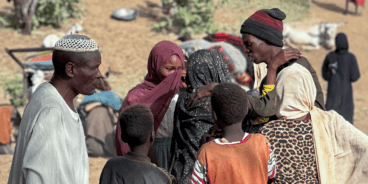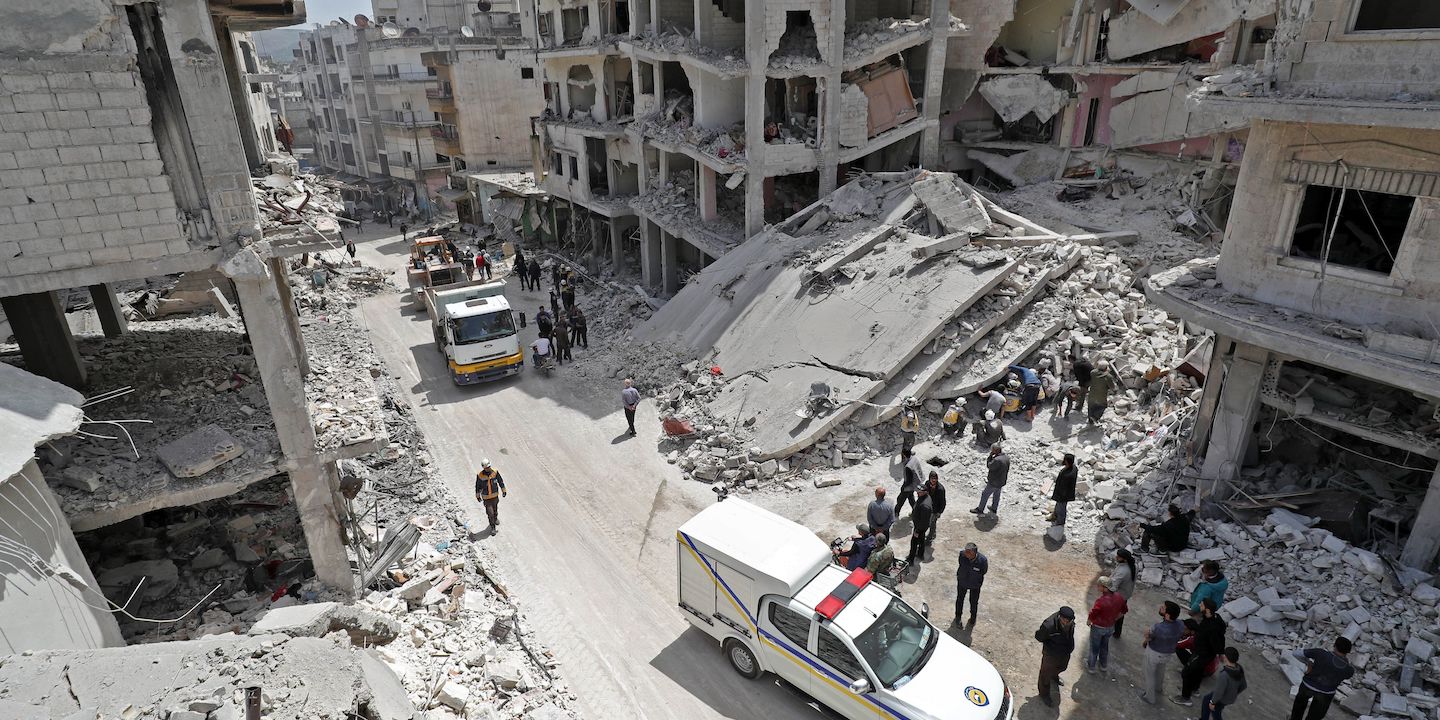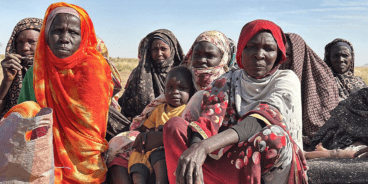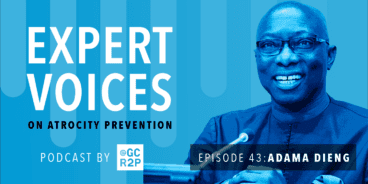

Atrocity Alert No. 198: Syria, Myanmar (Burma) and Sudan
Atrocity Alert is a weekly publication by the Global Centre for the Responsibility to Protect highlighting situations where populations are at risk of, or are enduring, mass atrocity crimes.
UN Board of Inquiry reports on bombing of protected sites in Syria
On Monday, 6 April, UN Secretary-General Antonio Guterres released a summary of the report from the Board of Inquiry into attacks on civilian objects in northwest Syria. After investigating seven incidents from 28 April to 28 July 2019 – including the bombing of several health facilities, a school and a displacement camp – the Board concluded that it was “plausible” or “highly probable” that five of the attacks were “attributable to the Government of Syria and/or its allies.” The Board also found that one of the attacks was likely attributable to Hayat Tahrir al-Sham or other armed opposition groups. Attacks on civilian objects violate International Humanitarian Law (IHL) and may constitute war crimes or crimes against humanity.
The UN Secretary-General created the Board of Inquiry after ten members of the UN Security Council (UNSC) issued a demarche on 30 July 2019 requesting an investigation into repeated attacks on civilian objects in northwest Syria. However, the Board’s report was not situated within the broader context in which the seven incidents took place: namely, widespread and systematic violations of international law by Russian and Syrian forces, the lawlessness of all the parties to the conflict, and the targeting of civilians as a strategy of war.
Since April 2019 the Syrian government and Russian forces have carried out a sustained bombing campaign in Idlib Governorate. Over 1,500 civilians have been killed and one million people displaced. However, despite playing a key role in the military offensive, Russia – a permanent member of the UNSC – was not explicitly mentioned in the report summary as potentially being responsible for any of the seven investigated incidents.
Meanwhile systematic and sustained attacks on medical facilities in northwest Syria have destroyed the region’s health infrastructure. They have also undermined the capacity of local health workers and humanitarian agencies to prepare for an imminent outbreak of COVID-19.
Several of the destroyed health facilities investigated by the Board of Inquiry appeared on a list for the “deconfliction mechanism” established by the UN Office for the Coordination of Humanitarian Affairs in 2014. The mechanism provided parties to the conflict in Syria with the location of these humanitarian objects and was intended to protect them.
Human rights organizations have called for the full Board of Inquiry report to be publicly released and emphasized that potential atrocity crimes in Syria cannot continue to go unpunished. All those responsible for war crimes and crimes against humanity in Syria should be identified and held accountable under international law.
Calls for a ceasefire and an end to the information blockade in Myanmar
The situation in Myanmar’s Rakhine State has been deteriorating since February when fighting intensified between Myanmar’s military and the Arakan Army (AA), an armed group seeking greater autonomy for the ethnic Rakhine Buddhist population. Dozens of civilians have been killed and at least 70,000 people are currently displaced across 154 sites in Rakhine and southern Chin states as a result of the ongoing violence.
Myanmar’s authorities have responded to the escalation by imposing mobile internet restrictions in several townships in Rakhine and Chin states, increasing the total number of townships under an internet blackout to nine. In late March the authorities also blocked access to over 200 websites, including news outlets covering the fighting in Rakhine State.
The government imposed the restrictions shortly after the International Court of Justice (ICJ) ordered Myanmar to comply with provisional measures to protect the ethnic Rohingya community from genocidal acts. The information blockade makes it difficult for the international community to monitor the situation in Rakhine State, and to verify Myanmar’s compliance with the ICJ ruling ahead of the country’s first progress report due in May.
Almost one million Rohingya who fled the genocide in Myanmar also face extensive mobile internet restrictions in refugee camps in Bangladesh. This has prevented populations from accessing crucial information about COVID-19, leaving them vulnerable to infection. There are currently no intensive care facilities in the densely-populated camps, where an outbreak of COVID-19 would be catastrophic.
Last week the Global Centre, together with 49 other organizations, issued an open letter to the government of Bangladesh urging them to “lift ongoing mobile internet restrictions and halt the construction of barbed wire fencing around the Rohingya refugee camps,” asserting that “these measures threaten the safety and well-being of the refugees as well as Bangladesh host communities and aid workers.”
Myanmar’s military should declare an immediate ceasefire in response to the COVID-19 pandemic, enabling humanitarian workers to provide vital medical assistance to vulnerable communities. The government should also lift internet and media restrictions in Rakhine and Chin states. The UN Security Council and all member states should call on Myanmar to ensure full compliance with the ICJ’s provisional measures order.
One year after popular uprising, Sudanese still waiting for accountability for atrocities
This Saturday, 11 April, marks the first anniversary of the coup d’état that led to the removal of President Omar Al-Bashir in Sudan. The coup followed four months of mass protests across the country, with hundreds of thousands of Sudanese demanding democracy and an end to corruption. Since then, under the leadership of a joint civilian and military council, Sudan has started a historic transition to democracy and to confronting the crimes of the former dictatorship.
Prior to his arrest by the Sudanese army, Bashir had ruled the country since seizing power in a June 1989 military coup. Under his command, Sudan’s security forces allegedly committed genocide in the Darfur region. As a result, Bashir and several of his senior officers were indicted by the International Criminal Court (ICC) in 2009. Crimes against humanity and war crimes were also perpetrated in the disputed provinces of South Kordofan and Blue Nile.
Although Bashir spent a decade defying the ICC and evading international justice, the transitional authorities in Sudan have charged him with illegally possessing foreign currency and corruption. Earlier this week it was announced that a domestic trial for crimes related to the 1989 coup and to a deadly crackdown that preceded his 2019 overthrow has been postponed due to COVID-19. During February Sudan’s transitional authorities also announced that several suspects indicted by the ICC, including Bashir, should face trial in The Hague.
Juliette Paauwe, Senior Research Analyst at the Global Centre, noted that “while much remains to be done to support Sudan’s fragile transition to peace and democracy, we should commemorate the courage and resilience of the Sudanese people who fought for justice and human rights during last year’s mass demonstrations.”
Despite ongoing talks between the transitional authorities and armed groups in Darfur, South Kordofan and Blue Nile, the security situation in Sudan remains precarious. Sudanese civil society organizations also continue to demand an independent investigation into the violent crackdown by the Rapid Support Forces during June 2019 that led to the death of at least 120 protestors. The recent attempted assassination of the civilian Prime Minister, Abdallah Hamdok, further underlines the fragility of the current transition.
The UN Security Council will soon decide on the possible drawdown and exit of the African Union-UN Hybrid Operation in Darfur, which has conducted peacekeeping operations since 2007. The Council should ensure that any subsequent UN mission in Sudan continues to prioritize the protection of civilians and includes uniformed personnel and human rights monitoring teams.
Related Content


Joint Statement: Genocide Returns to Darfur
